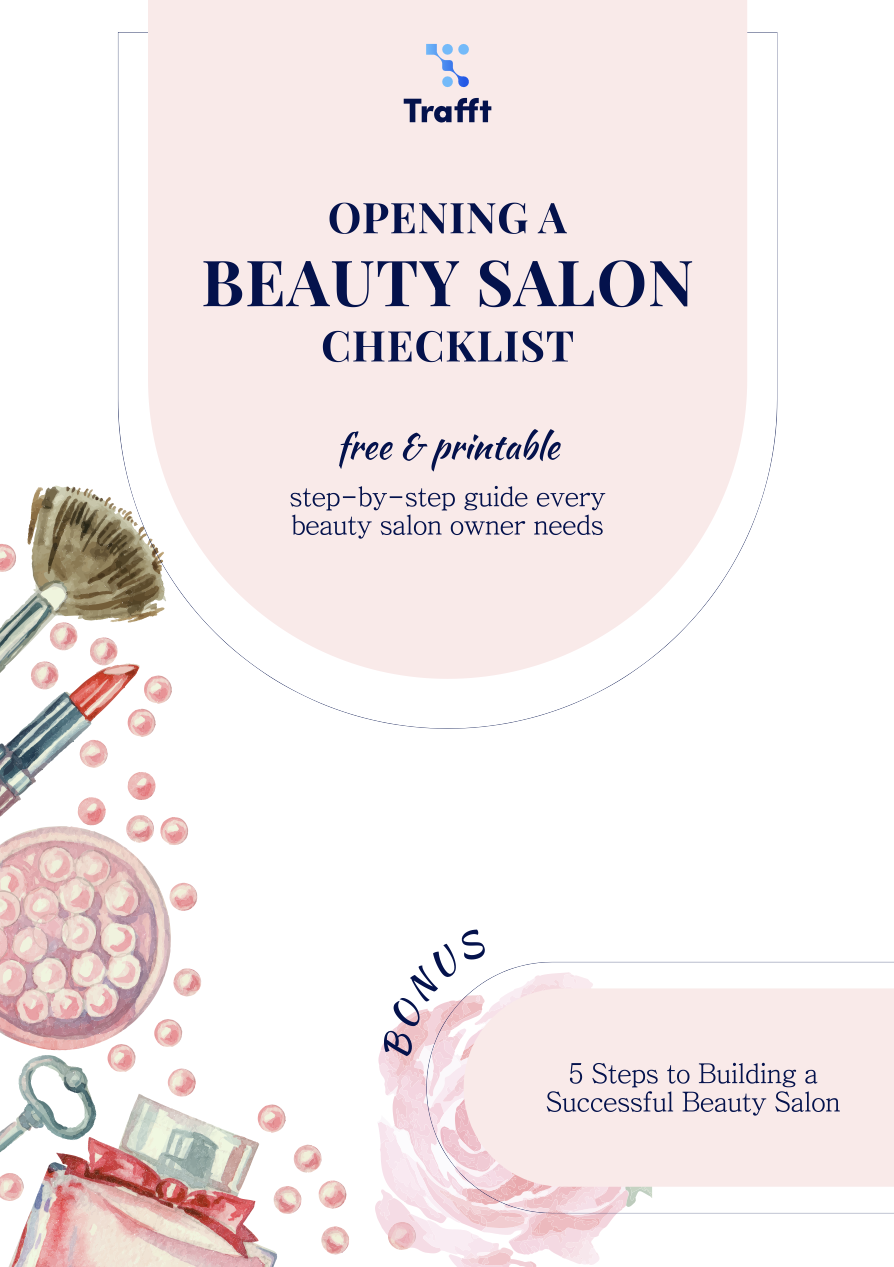Nail salons are one of the most profitable businesses nowadays, and with evolving technologies, products, trends and nail designs, it’s only getting more popular.
Like any other business, opening a nail salon requires obtaining the right licences and permits. Permits are crucial for ensuring your business operates legally, but also for maintaining high standards of safety and hygiene, which are especially important in the beauty industry.
Without proper licenses, you can face fines, health violations, or even be forced to shut down your business.
Let’s walk through the various permits and licenses you’ll need to legally operate a nail salon!
Thank you for subscribing. Check your mail for details
Understand Your Local Regulations
The first step for opening a nail salon business is to recognize permit and license requirements based on your location, be it city, state or country. The variations for these requirements stem from differing local laws, health standards, and zoning regulations, all of which are designed to ensure the safety and well-being of both clients and staff.
In the United States, each state has its own set of regulations governing nail salons. Some states, like California, require nail technicians to complete a 400-hour training program and pass both written and practical exams to obtain a license.
Requirements for nail technicians in New York are a 250-hour approved course of study and a health certification. Additionally, local municipalities may impose their own health and safety standards, building codes and signage regulations.
You should carefully research the specific regulations of your locality. This includes checking with local health departments, zoning boards, and licensing authorities to ensure that your salon meets all necessary legal and health standards.
Can I Open a Nail Salon Without a License?
Running a nail salon without the appropriate license is illegal and can lead to severe consequences, including fines, business closure, and legal action.
Some jurisdictions may not require the salon owner to hold a cosmetology license, all nail technicians performing services must be properly licensed. In some states, like New York, salon owners must obtain a business license, and all nail technicians must be licensed by the New York State Department of State Division of Licensing Services.
Operating a salon without license is considered a misdemeanor and can result in the salon being shut down.
Even if you’re not performing nail services yourself, you must make sure your employees are properly licensed. Hiring unlicensed technicians can expose your business to legal and financial risks. In addition, you need to adhere to health and safety regulations, which often include obtaining health permits, passing inspections, and maintaining proper sanitation practices.
In short, while you may not need a cosmetology license to own a nail salon in some areas, you can’t legally operate a nail salon without obtaining the necessary licenses and ensuring that all technicians are certified. Failing to do so can jeopardize your business and reputation.
Key Permits You Need to Open a Nail Salon
Business license
A business license is an official authorization issued by the local government authorities that allows you to legally operate your nail salon within a specific jurisdiction. This license ensures your business complies with zoning laws, health and safety regulations, and other local requirements.
Why do you need a business license?
Operating without this license can lead to fines, legal actions, or even closure of your salon, so you definitely need one. Plus, it will enhance your salon’s credibility and ensure you adhere to local laws and industry standards.
How to apply?
Application process for business license will vary depending on your location, but usually you’ll need to:
- Register your business name - ensure your salon’s name is not already in use.
- Choose a legal structure - decide on a sole proprietorship, partnership, or corporation.
- Complete the application - fill out required forms provided by your local business licensing office.
- Submit required documents - you’ll need to provide documents such as identification, proof of address, and any other requested paperwork.
- Pay the application fee - this fee ranges from $100 to $500 depending on your location and salon size
- Pass inspections - some jurisdictions require health, fire, or building inspections before issuing a business license.
The cost of a business license may vary, but it typically falls between $100 and $500 depending on your location and business size. In some states, you may pay additional fees and taxes, so you should budget accordingly.
Cosmetology license
Why do your nail technicians need a cosmetology license?
Even if you’re not performing services, all your staff members need a cosmetology license. It legally authorizes them to perform nail services, such as manicures, pedicures, and nail enhancements.
This license ensures technicians have received proper education and training, adhere to health and safety regulations, and maintain professional standards. Operating without one can result in legal penalties, fines and potential closure of the salon.
Requirements and process of obtaining the license
Again, this licensing process can vary depending on the location, but typically includes the following:
- Age and education requirements - applicants are usually required to be at least 17 or 18 years old and possess a high school diploma or equivalent.
- Completion of a state-approved nail technician program - they need to enrol and complete a program accredited by the state’s cosmetology board, in New York, for example, the program must consist of at least 250 hours of instruction.
- Pass written and practical exam - candidates must pass both written and practical exams that assess their knowledge, beauty qualifications, and skills in nail care and safety practices.
- Submit application and pay fees - the candidate must submit a completed application to the relevant licensing authority along with the required fees.
- Maintain continuing education - some jurisdictions require nail technicians to complete continuing education courses periodically to stay updated on industry standards and regulations.
You should consult with your local licensing authority to understand the specific requirements and processes applicable in your area.
Health and safety permits
Why do you need health and safety permits?
Your salon needs to comply with sanitation and safety standards set by local health departments, that’s why you need health permits. These permits protect clients from infections and unsanitary conditions, which are common concerns in beauty service businesses.
Health departments inspect and evaluate your salon’s cleanliness, proper disinfection practices, and ventilation systems.
Health department inspections and requirements for cleanliness
Health inspections are concluded at various stages:
- Opening of a business - During the business approval and building permit processes.
- Continuing bases - Once to multiple times a year, depending on risk level. These are generally unannounced visits.
During an inspection, these factors will be evaluated:
- Proper sanitation - Ensuring that tools and equipment are cleaned and disinfected properly.
- Ventilation - Assessing the salon’s ventilation systems to ensure proper air quality.
- Waste disposal - Proper disposal of waste materials to maintain hygiene.
- Chemical safety - Safe storage and handling of chemicals used in nail services
If you don’t meet all health standards, you can get penalties, or even have your salon closed.
Employer identification number (EIN)
An employer identification number is a unique identification assigned by the Internal Revenue Service to businesses operating in the US for tax purposes. You need it for hiring employees, applying for licenses and permits, and to ensure compliance with federal and state tax regulations.
How to apply for EIN?
- Online application - The fastest way is through the IRS website. Applying for EIN is free of charge, and once your information is validated, you’ll receive EIN immediately.
- Mail - Alternatively, you can complete Form SS-4 and mail it to the IRS. They will send you EIN within a few business days
- By phone - For international applicants, you can apply by calling the IRS.
For applying, ensure you have all the necessary documents, such as your business structure and the responsible party’s taxpayer identification number. You need to obtain an EIN for your employees to ensure your salon operates legally, and is in compliance with federal regulations.
Fire department permit
Nail salons have flammable substances like acetone, alcohol, and nail polishes, so ensuring your salon complies with fire safety regulations is crucial for protecting both clients and staff.
Depending on your location, you may need to obtain a fire safety permit and pass inspections to ensure everything is in compliance with local fire codes. Check out New York’s Fire Department rules and regulations.
To ensure safety standards, implement the following:
- Proper storage - Store flammable chemicals in UL-approved cabinets.
- Adequate ventilation - Make sure proper exhaust ventilation is in place to disperse fumes.
- Emergency equipment - Make sure fire extinguishers are easily accessible.
- Clear signage - Display working exit signs and flammable material warnings.
Safety should always come first, so obtaining these permits and adhering to safety protocols you not only ensure compliance with local fire regulations, but also create a safe environment for your employees and clients.
Zoning permits and land use approvals
Zoning laws regulate land use within a municipality, dictating where specific types of businesses can operate. These laws make sure that specific businesses, such as nail salons, are situated in areas designated for that purpose, maintaining community safety and order.
Ensuring zoning compliance
You need to confirm that your chosen location is in compliance with the zoning laws:
- Contact local authorities - Reach out to your city’s Planning or Zoning Department to verify that the property is zoned for commercial use and allows personal care services.
- Review zoning maps - Look up zoning maps online to check the property’s zoning designation and any overlay zones that might impose additional restrictions.
- Obtain necessary permits - If the property isn’t zoned, you need to apply for zoning variance or land use permit, which can involve public earnings and lengthy approval process.
Insurance requirements
While these are not permits, you need appropriate insurance to legally and financially safeguard your nail salon. Insurance protects your salon from potential lawsuits, accidents, and other unforeseen events that could otherwise lead to significant financial losses.
Types of insurance you need
- General Liability Insurance - This insurance protects against third-party claims for bodily injury or property damage occurring on your premises. For example, if a client slips and falls, general liability insurance can cover medical expenses and legal fees.
- Professional Liability Insurance - This insurance is also known as malpractice insurance. It covers claims of negligence or mistakes in the service provided. It’s essential for protecting against allegations of substandard work or client dissatisfaction.
- Workers’ Compensation Insurance - Required in most states if you have employees, this insurance covers medical expenses and lost wages for staff injured on the job.
- Commercial Property Insurance - This policy protects your salon’s physical assets, including equipment and inventory, from risks like theft, fire, or vandalism. It makes sure you can quickly recover from property damage.
Take Your Nail Salon Business to the Next Level with Trafft
Are you looking for a golden employee who’s gonna take care of bookings, cancellations, payments and employee management? Well, look no further, because Trafft is a dream come true for every nail salon owner!
- You don’t have a website? Let Trafft generate a booking page in just a few minutes! You do have a website? Embed Trafft’s booking form with just a few clicks and start accepting bookings!
- Trafft lets your clients choose a nail service they want, pick a date and time slot, and even set up recurring appointments.
- Receive online payments through various payment gateways like PayPal, Mollie, Stripe, Square, and Authorize.Net.
- Your clients often forget about their appointments and don’t show up? Trafft sends automated SMS and email reminders so they always stay on track.
- Manage your employee’s working hours, days off, and even assign one employee to a specific job
Trafft has so many more features that can help you boost your business and streamline your operations! With customizable settings, real-time analytics, and seamless integration with other tools, this booking software provides everything you need to deliver exceptional customer service!
Check out all Trafft’s features now, and start your path to success!
Closing Thoughts on Nail Salon Permits and Licenses
If you still wonder “Can I open a nail salon without a license” the simple answer is no. Opening a nail salon requires compliance with a variety of legal requirements, including permits, licenses, and insurance.
Every permit ensures you protect both your business, your clients, and your employees. Taking the time to understand and fulfill these requirements will help you build a solid foundation for a successful, legally compliant, and well-run nail salon!







